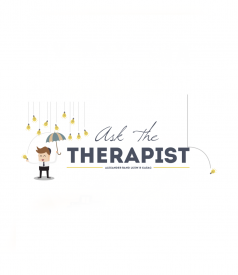Alexander Rand LCSW-R CASAC is a licensed clinical social worker and addictions therapist. He received his master’s degree from Fordham University. He has worked in both inpatient and outpatient facilities, at various Yeshiva high schools in Brooklyn, and as an administrative supervisor for JBFCS
He currently maintains a private practice in Brooklyn NY and serves as an adjunct professor at Brooklyn College and Touro College Graduate School of Social Work.
July 4, 2018
Other posts by:
Alexander Rand
Follow us

I liked your article in The Jewish Echo this past month, and while I agree with most of what you wrote, there was one thing that puzzled me. Growing up, we never had these “dry” kiddushim. We saw our fathers have a l’chaim or two (or three), but that was it. I feel like today alcohol has been labelled as the “devil’s juice,” and that social drinking has become stigmatized. I was always taught that there is nothing wrong with having a shot or two at a kiddush, and I teach my children the same. I watched the Amudim Kiddush club video with my kids and they asked me, “Why is it saying that kiddushim are bad? Daddy you drink whiskey on Shabbos and don’t do those things. Does everyone else get drunk?” I explained to them that an excess of anything is not good, and that kiddushim aren’t bad, you just must control yourself. What’s your opinion about on this?
Thank you for following up. I think you brought up some valid points. Although I briefly touched on the idea of moderation in the previous article, perhaps it should have been given more attention.
We do often hear of the push for more “dry” kiddushim and simchos in light of the growing problem of addiction in our community. Is this the way to go? If we as a community agree to “ban” alcohol, will that solve (or greatly reduce) the problem of both adolescents and adults developing addictions? I am sure there are different views about this depending on whom you ask.
I think one danger of this type of approach is we are training ourselves to solve problems by eliminating their sources. Unfortunately, this cannot work in the long run. Should we “ban” cake and cookies in response to the growing problem of obesity and resulting health issues? Or ban certain clothing companies to ensure the halachos of tznius are followed? This can become a never-ending process. Bloomberg proposed such an idea in 2012. He tried to pass legislation to prohibit the sale of sweetened drinks larger than 16 ounces. It never passed, and as one Cornell professor pointed out, “This is not directly targeting obesity; it is targeting soda. Sodas overall are a pretty small part of the equation when it comes to obesity.”
We live in a world with many resources that can be used both constructively and destructively. I believe our job as individuals and parents is to learn how to properly utilize these resources for the good and raise our children with the same approach. Risk is an inherent part of being human, but we can think about our options and make healthy choices
I think it is important to point out though, that while one approach may work for adults, we need separate guidelines for children. The teenage years are a time of exploration and independence-seeking, and it is “normal” for a teen to experiment with certain behaviors.
Aside from the legal issues in serving alcohol to minors, we know that the earlier (in age) someone starts drinking, the more likely it is that they will develop an addiction. Until about age 25, the brain is still growing. Each time a new memory is formed or a new skill is learned, stronger connections – or synapses – are built between brain cells. Young people’s brains build synapses faster than adult brains. Because addiction is a form of learning, adolescents can get addicted more easily than adults. Of course, teaching by example and modeling our behavior is one of the most effective tools we have. But aside from that, we need to be able to provide a safe space for open discussion with our children and to try to be their main source of support as they navigate through this challenging time in their lives. The earlier we invest in their growth and success, the greater the dividends in the long run. Joseph Anthony Califano, Jr. is a former United States Secretary of Health and the founder and chairman of The National Center on Addiction and Substance Abuse at Columbia University (CASAColumbia). He famously stated, “We have often said that the most important finding of 20 years of intensive research is this: A child who gets through age 21 without smoking, abusing alcohol, or using drugs is virtually certain never to do so.”
I liked your article in The Jewish Echo this past month, and while I agree with most of what you wrote, there was one thing that puzzled me. Growing up, we never had these “dry” kiddushim. We saw our fathers have a l’chaim or two (or three), but that was it. I feel like today alcohol has been labelled as the “devil’s juice,” and that social drinking has become stigmatized. I was always taught that there is nothing wrong with having a shot or two at a kiddush, and I teach my children the same. I watched the Amudim Kiddush club video with my kids and they asked me, “Why is it saying that kiddushim are bad? Daddy you drink whiskey on Shabbos and don’t do those things. Does everyone else get drunk?” I explained to them that an excess of anything is not good, and that kiddushim aren’t bad, you just must control yourself. What’s your opinion about on this?
Thank you for following up. I think you brought up some valid points. Although I briefly touched on the idea of moderation in the previous article, perhaps it should have been given more attention.
We do often hear of the push for more “dry” kiddushim and simchos in light of the growing problem of addiction in our community. Is this the way to go? If we as a community agree to “ban” alcohol, will that solve (or greatly reduce) the problem of both adolescents and adults developing addictions? I am sure there are different views about this depending on whom you ask.
I think one danger of this type of approach is we are training ourselves to solve problems by eliminating their sources. Unfortunately, this cannot work in the long run. Should we “ban” cake and cookies in response to the growing problem of obesity and resulting health issues? Or ban certain clothing companies to ensure the halachos of tznius are followed? This can become a never-ending process. Bloomberg proposed such an idea in 2012. He tried to pass legislation to prohibit the sale of sweetened drinks larger than 16 ounces. It never passed, and as one Cornell professor pointed out, “This is not directly targeting obesity; it is targeting soda. Sodas overall are a pretty small part of the equation when it comes to obesity.”
We live in a world with many resources that can be used both constructively and destructively. I believe our job as individuals and parents is to learn how to properly utilize these resources for the good and raise our children with the same approach. Risk is an inherent part of being human, but we can think about our options and make healthy choices
I think it is important to point out though, that while one approach may work for adults, we need separate guidelines for children. The teenage years are a time of exploration and independence-seeking, and it is “normal” for a teen to experiment with certain behaviors.
Aside from the legal issues in serving alcohol to minors, we know that the earlier (in age) someone starts drinking, the more likely it is that they will develop an addiction. Until about age 25, the brain is still growing. Each time a new memory is formed or a new skill is learned, stronger connections – or synapses – are built between brain cells. Young people’s brains build synapses faster than adult brains. Because addiction is a form of learning, adolescents can get addicted more easily than adults. Of course, teaching by example and modeling our behavior is one of the most effective tools we have. But aside from that, we need to be able to provide a safe space for open discussion with our children and to try to be their main source of support as they navigate through this challenging time in their lives. The earlier we invest in their growth and success, the greater the dividends in the long run. Joseph Anthony Califano, Jr. is a former United States Secretary of Health and the founder and chairman of The National Center on Addiction and Substance Abuse at Columbia University (CASAColumbia). He famously stated, “We have often said that the most important finding of 20 years of intensive research is this: A child who gets through age 21 without smoking, abusing alcohol, or using drugs is virtually certain never to do so.”



